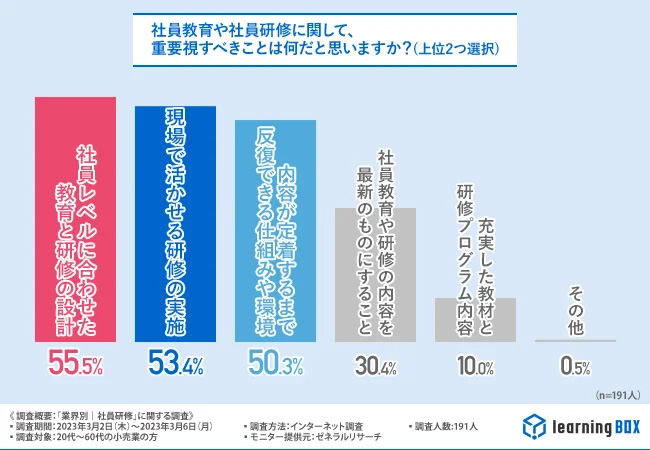
LearningBOX Inc. conducted a survey of retailers in their 20s to 60s regarding "Industry-specific|Employee Training.
Of the results of the survey, which covered a total of five industries*, we are pleased to announce the results for the retail industry.
*5 industries in total: medical care, finance, retail, manufacturing, and local government.
Survey Results Topics
zOnly in the retail industry did the top three "important things to consider in employee training" all have a high percentage of 50% or more.
z The percentage of respondents who said that "substantial teaching materials and training program content" was the lowest among all five industry categories.
<Survey Summary
1. survey method: web-based questionnaire using monitors from General Research Corporation
2. survey target: retailers in their 20s to 60s among General Research's registered monitors
Number of valid responses: 191
4. survey dates: March 2, 2023 (Thursday) to March 6, 2023 (Monday)
<Results of the survey of other industries
Medical Care:https://learningbox.co.jp/news/medical_care_report/
Finance :https://learningbox.co.jp/news/finance_report/
The most common employee training programs in the retail industry tend to be new employee and mid-level employee training and compliance training. Regarding the format, only 16.8% of the training was conducted online only.
A survey of 191 retailers was conducted.
First, when asked what type of employee training was conducted, the results were "online (16.8%)," "face-to-face (46.6%)," and "both online and face-to-face (36.6%).
Next, what type of employee training do you receive? (*Including open recruitment), the most common response was "New employee training (45.6%)," followed by "Mid-level employee training (32.5%)" and "Compliance training (31.9%).
Retail training is being used in the business, but there is room for change in content
In the retail industry, about 80% (81.1%) of respondents indicated that they need to change the content of their employee training every year, and about 70% (69.6%) felt that the content of that employee training is applied to their work.
Furthermore, when surveyed on how satisfied they are with their current employee training, nearly 40% (37.7%) are not satisfied.
On the other hand, we also asked them about what aspects they were satisfied with.
Some excerpts on specifics are,
I am satisfied with the fact that they taught me the basics such as how to use honorifics, which helped me in customer service (30s / Wakayama Prefecture).
It was good that I was taught one-on-one and was able to ask everything I wanted to know (30s / Aichi, Japan).
The ability to conduct training not only in person but also in an easy online format (30s / Tokyo)
The more security-related training, the better (50s/Tokyo)
They seem to be satisfied with this point.
They were satisfied with the content of the training, such as customer service and security, and with the format of the training, such as one-on-one or online.
The most common training issue in the retail industry is "forgetting the content of employee education and training after some time" at 42.9%.
When asked what problems they felt about employee training, the most common response was "I forget the content of employee education and training after a while (42.9%)," followed by "I cannot acquire sufficient knowledge and skills (34.0%)" and "There is no place to use the knowledge and skills I have acquired (28.3%). (28.3%)" followed.
We found that there are relatively common challenges to employee training in the retail industry, but we asked for more specifics on how they perceive the challenges,
・Does not have enough manpower for training and cannot get time for guidance from the person in charge (20s/Saitama)
Sometimes there is a difference between what the person in charge says and what others say (30s / Aichi Prefecture).
Long intervals between training sessions make me feel overwhelmed by the daily routine (40s/Niigata Prefecture).
Immediately after the training, they can remember and practice various methods of coping with problems, but as time passes or they become accustomed to them, they gradually stop doing so (60s / Shizuoka Prefecture).
The respondents seemed to feel that they were facing challenges in these areas.
Only in the retail industry did the top three most important things to consider in employee education and training exceed 50%.

When asked what they felt was important in terms of employee education and training, the most common response was "Designing education and training that matches the employee's level (55.5%)," followed by "Implementing training that can be applied in the field (53.4%)," and "A system and environment that allows repetition until the content takes root (50.3%). (50.3%)" followed.
The retail industry was the only industry in which all three of the top three were above 50% throughout the whole (municipalities, manufacturing, retail, financial, and medical care).
In addition, we asked specifically what we should do to make employee education and training meaningful,
Manner lectures, etc. depend on the person and are inaccurate. I would like to see manuals distributed that can be applied more concretely to the content of work (30s/Tokyo).
We should create more and more opportunities to exchange opinions with each other, including other trainees (30s / Aichi).
To hear realistic opinions from those who know the site well (40s / Osaka)
Proactive use of outside instructors (50s / Osaka)
Although online training has increased since the Corona disaster, it is time to get together and conduct face-to-face education and training (50s / Aichi Prefecture).
The content of the training should be interesting and applicable to actual workplaces (60s / Aomori, Japan).
The responses were as follows.
In order to make employee education and training more meaningful than it is now, many people in the field seemed to have a variety of opinions and ideas on how to improve it.
Summary: Only retailers had more than 50% of the top three "important things" to consider in training.
As in other industries, the most common response to the issue of employee training in the retail industry was "employees forget the content of employee education and training after a while," at approximately 40% (42.9%).
On the other hand, when asked what they felt was important in terms of employee education and training, the responses were "designing education and training that matches the employee's level," "implementing training that can be applied in the field," and "a system and environment where the content can be repeated until it takes root," with the percentages of these responses exceeding 50%. All of them exceeded 50%.
When asked what specific things they think should be done to make employee education and training more meaningful, we received opinions from a variety of perspectives, which suggests that many people may feel that the retail industry is facing challenges regarding education and training.